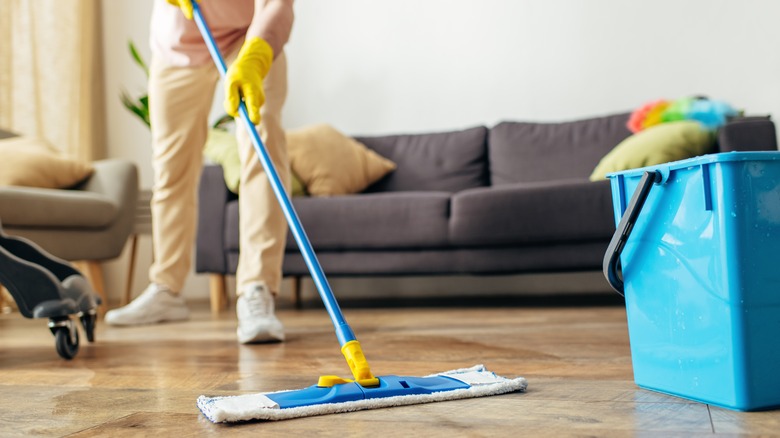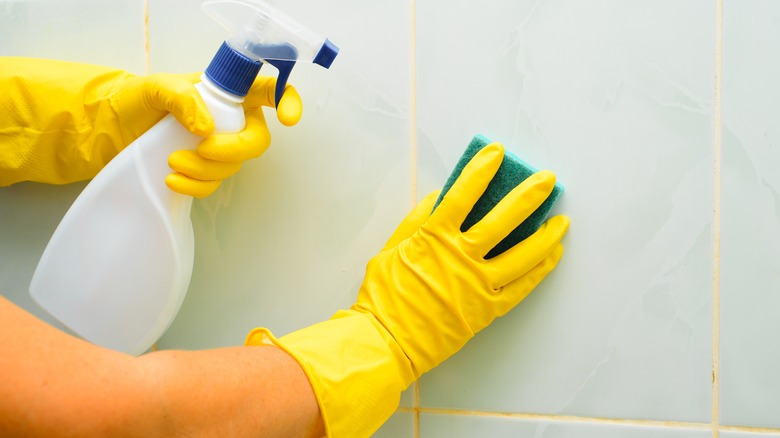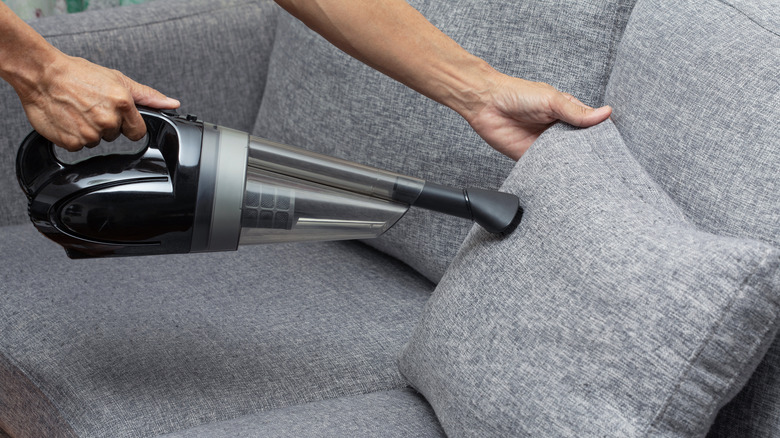Why A Deep Fall Cleaning Is Every Bit As Important As A Deep Spring Cleaning
We may receive a commission on purchases made from links.
Spring cleaning is a fairly well-established practice, and even if it seems old-fashioned, we still do it to clear out clutter, dust, and grime that has built up in the house over the winter. Washing linens and curtains, cleaning rugs, opening windows to let in fresh air, scrubbing floors and baseboards are all part of spring cleaning's list of chores. But what about deep cleaning in the fall, before winter starts? As it turns out, this is nearly as important as spring cleaning, but for different reasons. There are many benefits to deep fall cleaning, including improving physical and mental health, staying organized for the holidays, and preventing insect and rodent pests from becoming a problem.
Physical health benefits of a deep fall clean include cutting down on dust and preventing the formation of mold and mildew. Dust, mold, and mildew can all potentially negatively impact your health. A clean, organized space is said to have mental health benefits as well – creating a tranquil, cozy space is essential as we spend more time indoors during cold weather. Taking time to do some deep cleaning in the fall can also include garden clean up, cleaning the gutters, putting summer clothing into storage, and stocking the pantry.
Another consideration is the possibility that some insect and rodent pests may plan to take up residence as the weather grows colder. You may discover minor repairs that need to be completed (like filling in gaps or holes) to prevent their entry; fall cleaning can help uncover these potential problem areas. Maintaining a clean home is one of the best ways to deter pests.
Which areas to prioritize for fall cleaning
Think about how your living habits change once cold weather sets in. You probably spend a lot more time indoors, and you may cook and eat more at home. You also wear bulkier clothing and shoes for winter weather. Consider these habits when deep fall cleaning to help you decide where to focus your efforts based on your home's layout and lifestyle.
Thoroughly cleaning your mudroom or entryway before winter grime and salt build-up is a good idea. Cleaning your kitchen surfaces and storage areas will help better organize your space for holiday preparations, winter cooking, and meal preparation. This task includes the pantry, fridge, and freezer: tossing out expired items and disinfecting surfaces and appliances. Vinegar and baking soda are a great cleaning combo to freshen things up and prevent mold and mildew.
More time spent indoors in winter can mean a slow build-up of dust and grime, so deep cleaning of the bathroom and bedroom spaces can help you get a head start on your winter cleaning routine, making it a bit easier in the long run. Scrub the toilet, tub, shower, and sink thoroughly. Clean or organize the area under the sink or vanity, and tidy up shelves or linen closets. Toss out expired cosmetics and donate unused linens. If you have areas that get cold or damp in winter, you may notice a musty odor that can build up on fabrics like clothing or towels. Fluffing them in the dryer with wool dryer balls and a few drops of lavender essential oil will help address this problem.
Fall cleaning to deter insects and rodents
When the weather turns colder, some insects and rodents seek warmer places to live so they may move from outside your house to indoors. Doing a deep clean can help deter them in several ways. Some insects and rodents are attracted to dirt, while others are drawn to small food particles. Vacuuming thoroughly can help remove crumbs or dust that may draw pests. Vacuum in corners, closets, and under sofa and chair cushions. Clean wood floors thoroughly (including corners and underneath furniture) with a damp cloth and a basic cleaner, like a diluted solution of Murphy's Oil Soap or vinegar.
Some pests dislike certain smells, and using essential oils can help repel them. Making a spray solution with water and essential oils is an easy way to repel these pests. Mice and other rodents detest the smell of peppermint, so spray it in places where these critters are likely to try and enter, like the edges of doorframes and window sills. Peppermint is also shown to be effective at deterring spiders, which can also become a nuisance in winter (though spiders do eat other insects, so it can be a trade-off).
If you have pets, fleas, mites, or ticks can come indoors with them as winter approaches. In addition to whatever methods you use to protect your pets, spritz their beds and your entryways with a diluted spray containing any of the following essential oils: lavender, peppermint, eucalyptus, cedarwood, rosemary, or lemongrass. Lavender and cedarwood also repel moths from areas where you store your wool clothing. You can grab a 10-piece Essential Oils Set to stock up.


